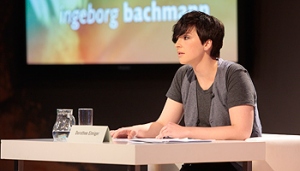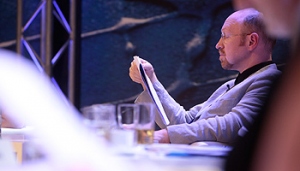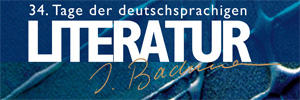 Dorothee Elmiger (Bild: Johannes Puch)
Dorothee Elmiger (Bild: Johannes Puch)
Dorothee Elmiger (CH)
Dorothee Elmiger was the last author of the first day of readings. With her text “Einladung an die Waghalsigen” [invitation to daredevils], the first five hours of the Bachmann Prize came to a very promising and “positive conclusion”, said presenter Clarissa Stadler.“Policeman’s daughter’s prose of a young author”
“Original and very cleverly executed prose for such a young author”, Meike Feßmann started her criticism. The playing field she created – a post-apocalypse period and two sisters telling each other about their fantasies – gives the author the tremendous freedom to play with anything she feels like.
The language is a kind of policeman’s daughter’s prose, a little awkward and protocol-like, which, however, also lends the text a stubbornly defiant sassiness. “Very original.”
Author portrait
Reading
Discussion
 Dorothee Elmiger (Bild: Johannes Puch)
Dorothee Elmiger (Bild: Johannes Puch)
“Deep Water Horizon Drama”
“I share this view”, Hubert Winkels started. “I am reminded – rightly or wrongly – of the Deepwater Horizon Drama, which continues while we sit here. Here we have the analogous fantasy that the coal deposits underground have started to burn and continue to smoulder – an ‘apocalyptic screen’.”
“Done in a very playful way, also in content”, says Winkels, since the remaining books in that world are linked to the lives of the protagonists. According to Winkels, who draws a parallel with Horvath’s “Youth Without God”, one could ask oneself whether the text can be understood as a parable of youth.
Choir of the laudators
Karin Fleischanderl joined in the “choir of the laudators”: “I also like the story very much.” She believes that the text can also be read as a “time diagnosis” of youth in a post-apocalyptic world or postmodern situation, “where everything is levelled out and without secret”. It describes a young girl and her ideas about adventure and secrets: “Original, lively, smart and very well executed”, Fleischanderl concluded.
“Glad that the text is being explained to me”
“I am glad that the text has been explained to me now – I didn’t really know what to do with it”, was Alain Claude Sulzer’s objection to his enthusiastic colleagues. “I am happy to accept what you are reading here – three years ago we had the idea to give an award to the most original text. If so, then this one would have been shortlisted.” He has to ask himself, however, who the text is written for, said a perplexed Sulzer. “My answer is: not for me.”
 Burkhard Spinnen (Bild: Johannes Puch)
Burkhard Spinnen (Bild: Johannes Puch)
Suggestion by Paul Jandl
The text was suggested by Paul Jandl, who, after Sulzer’s address to the audience, “helped interpret it”. The river Buenaventura in the text is a sign that there is still something like flowing, like time – and thus also the possibility of escaping a time that has come to a standstill. “This is all solved in a very poetic way and cleverly done, you have to go with the big adventure of the text, which takes place on only a few pages.”
Meike Feßmann on the other hand, thought that the language of the text is “bureaucratic” and “artificial”; nonetheless, the text is “strangely fresh”, thanks to the montage. “Entirely stilted and awkward German.” – “No, an attempt at finding a language!”, Jandl objected.
Enthusiastic about the chosen images
“The text is not just a montage or collage – the narrative principle here is intertextuality”, Hildegard Elisabeth Keller once again joined the discussion. The river “Buenaventura” is also a metaphor for the search for the “happy way”, the mediaevalist is enthusiastic about the chosen images. “The reader, too, gets to be at the mercy of this text – I myself turned into an echo chamber when I read it”.
“The search for something....”
In the time of computer games, “the search for something, the famous quest” – which is what Elmiger’s text reminds him of – is quite a normal literary topic, Burkhard Spinnen began his remarks, “even if you don’t play any computer games yourself”. The way the text joins its images is “rendered”, like on the computer.
“It’s impressive how the text produces awareness and education bashing.” While the crucial question – namely: “Where is this going?” – remains open, Spinnen does believe that the author is able to “create significantly different and better things with her language”.
Barbara Johanna Frank
 TDDl 2010
TDDl 2010